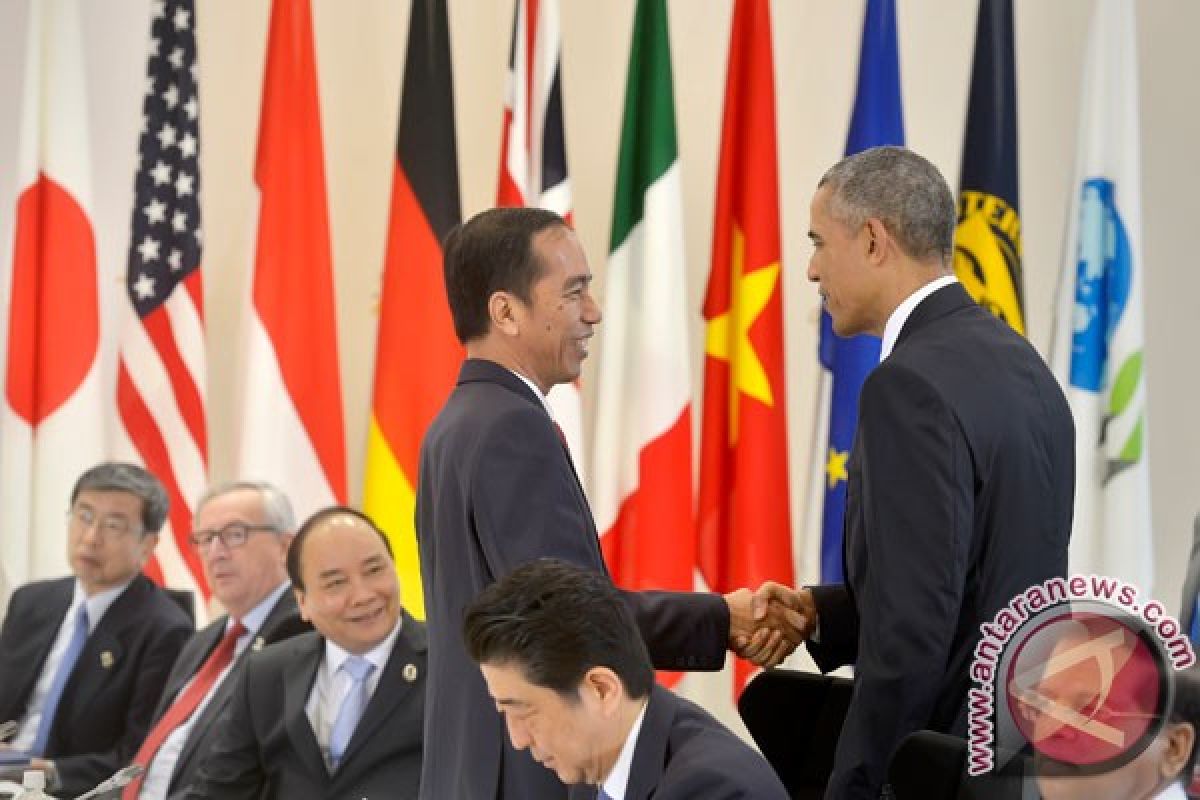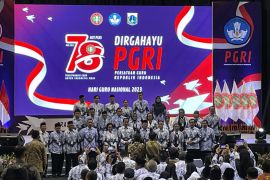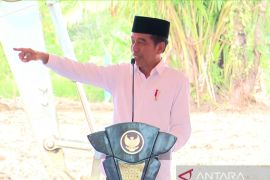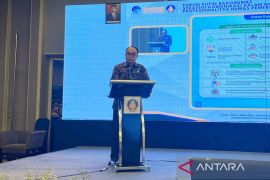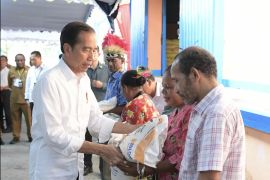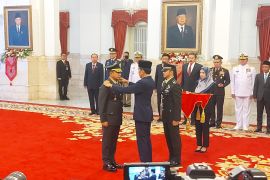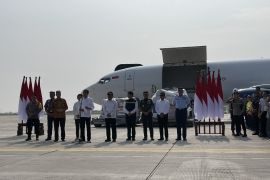Indonesia is ready to be motor in creating peace in Asia as well as in the world."Jakarta (ANTARA News) - A war is not only bloody, cruel and expensive but also detrimental to economic growth.
The reality was highlighted by President Joko Widodo (Jokowi) in his key speech during the Outreach Meeting at the G-7 Summit attended by leaders of seven industrial powers - Britain, Canada, France, Germany, Italy, Japan and the United States, in Ise-Shima, Japan, on May 27, 2016.
"In 2014, the economic impact of armed violence on the global economy in 2014 measured a staggering US$14.3 trillion, or 13.4 percent of the global gross domestic product (GDP)," the president, who was accompanied by Foreign Affairs Minister Retno LP Marsudi, said.
Therefore, he urged regional and international conflicts must be settled peacefully.
"Indonesia is ready to be motor in creating peace in Asia as well as in the world," Jokowi affirmed in the meeting moderated by Japanese Prime Minister Shinzo Abe.
It is time for the world to be aware of the importance of settling conflict without creating bigger conflict, according to him.
"Settling conflict militarily or by force would lead to other forms of violence such as extremism, even humanitarian crisis," he said.
All nations without exception should abide by international law, otherwise peace and stability could not be maintained, he said.
The world affairs are no long a bipolar issue as many emerging countries have proved to be able to contribute greatly to settling global problems.
Therefore, emerging countries should be involved in creating world order, he added.
Furthermore, he pointed out that the Asia-Pacific region is the safest, so it is not surprising that its forecasted economic growth is relatively better at 5.3 percent, compared to the global average of 3.2 percent.
"In 2015, Indonesias economy in the last quarter grew 5.04 percent," noted Jokowi, who was the keynote speaker during the first Outreach Session at the G-7 Summit in Ise-Shima, Japan, on Friday.
The world also understands that Asia still has immense potential to develop further, he emphasized.
Based on a projection of the Asian Century 2050 report, Asias GDP will increase to $174 trillion in 2050, or 52 percent of the global GDP.
Indonesia, as a nation in Asia, is optimistic of being part of the Asian Century.
"At present, more than 50 percent of Indonesias population is below 29 years of age. Indonesia is also blessed with abundant natural and energy resources," Jokowi remarked.
Peace and stability must be created and maintained, hence Asian nations, with complete focus, must promote them, he noted.
The president also affirmed that all potential conflicts in Asia, such as the disputes in the South China Sea and Korean Strait, must be resolved amicably.
Jokowi said Indonesia does not want Asia to be torn by conflicts and become battle ground for big powers.
The G-7 leaders attended the summit were Shinzo Abe as host, French President Francois Hollande, Britains Prime Minister David Cameron, Canadian Prime Minister Justin Trudeau, Italys Prime Minister Matteo Renzi, German Chancellor Angela Merkel and U.S. President Barack Obama.
President Jokowi and six other leaders from Asia and Africa were invited to the extended session of the summit.
The six other leaders were Prime Minister Sheikh Hasina of Bangladesh, Chad President Idriss Deby Itno, Lao Prime Minister Thongloun Sisoulith, PNG Prime Minister Peter O'neill, Sri Lankan President Maithripala Sirisena, and Vietnamese Prime Minister Nguyen Xuan Phuc.
In a 32-page declaration issued at the conclusion of the summit, the Group of Seven industrial powers pledged to seek strong global growth and vowed to use all policy tools to boost demand and ease supply constraints.
"Global growth remains moderate and below potential, while risks of weak growth persist," they said in the declaration, adding that "Global growth is our urgent priority."
On the sidelines of the summit, President Jokowi held bilateral meetings respectively with Prime Minister Abe and President Hollande.
Jokowi and Abe discussed other crucial issues including the efforts to intensify economic cooperation between Indonesia and Japan.
The trade balance between Indonesia and Japan in 2015 reached US$31.27 billion, constituting exports valued at $18.01 billion and imports at $13.26 billion.
Japan is ranked third among the list of major countries investing in Indonesia, with total investment worth $2.87 billion spread across 2,030 projects.
"We highly laud the presence and contribution of Indonesia as the largest nation in the ASEAN during the G-7 Outreach Summit," Abe told Jokowi.
Abe expressed hope that the automotive tariff issue will be addressed soon.
The automotive tariff issue could be dealt along with the issue of market access for fishery, agricultural, and horticultural products (R and Q category) as one package," President Jokowi affirmed.
They also discussed a cooperation plan to develop Patimban seaport in West Java.
Jokowi has designated the transportation minister to function as the focal point to follow up on the seaport projects cooperation plan.
The leaders also touched on cooperation for the development of an electricity project in Batang and a plan to construct a trans-northern Java railway line.
The meeting between Jokowi and Abe was the fourth of its kind to be held in less than two years, thereby reflecting the two nations commitment to boosting bilateral ties.
On the previous day, President Jokowi received a courtesy call from Aichi Governor Hideaki Ohmura in Nagoya.
The Head of State called for an increase in investment from the Japanese prefecture of Aichi, particularly in Indonesias manufacturing and industrial sectors.
The value of Aichis investment in Indonesia has doubled over the past five years.
The Aichi governor has invited Garuda Indonesia to operate a direct flight to Nagoya.
(T.F001/KR-BSR/B003)
Editor: Priyambodo RH
Copyright © ANTARA 2016
